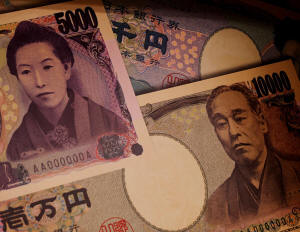Japanese authorities confer on weak yen, hint at intervention option
 Send a link to a friend
Send a link to a friend
 [March 27, 2024] By
Tetsushi Kajimoto [March 27, 2024] By
Tetsushi Kajimoto
TOKYO (Reuters) -Japan's three main monetary authorities held an
emergency meeting on Wednesday to discuss the weak yen, and suggested
they were ready to intervene in the market to stop what they described
as disorderly and speculative moves in the currency.
In a sign of growing urgency to put a floor under the yen after the
currency fell to a 34-year low against the dollar, the Bank of Japan,
the Finance Ministry and Japan's Financial Services Agency held a
meeting late in Tokyo trading hours.
In a briefing afterwards, top currency diplomat Masato Kanda said he
"won't rule out any steps to respond to disorderly FX moves". Kanda also
said the BOJ would respond through monetary policy if currency moves
affected the economy and price trends.
The dollar slipped against the yen on news of the meeting and was last
at 151.32 as Kanda spoke. Earlier, the yen was at 151.97, weaker than
the 151.94 level at which Japanese authorities stepped in during October
2022 to buy the currency.
The yen has continued to lose ground despite a historic shift away from
negative interest rates by the BOJ last week.
A weaker yen makes Japanese imports more expensive, fuelling inflation
and making the cost of living higher.
Earlier in the day, Finance Minister Shunichi Suzuki said authorities
could take "decisive steps" against yen weakness - language he hasn't
used since 2022 when Japan last intervened in the market. He made his
remarks shortly after the dollar spiked on strong U.S. data.
"Now we are watching market moves with a high sense of urgency," he told
reporters.
"If there's excessive moves, we will take decisive steps and not rule
out any options."
Christopher Wong, a currency strategist at OCBC in Singapore, said
markets were gingerly testing to see where's the line for Tokyo.
"I think that the risk of intervention is quite high, because this is a
new cycle high," he said, adding that if Tokyo doesn't act, it would
just encourage people to push the dollar/yen a lot higher in the next
few days.

[to top of second column] |

Examples of Japanese yen banknotes are displayed at a factory of the
National Printing Bureau producing Bank of Japan notes at a media
event about a new series of banknotes scheduled to be introduced in
2024, in Tokyo, Japan, November 21, 2022. REUTERS/Kim Kyung-Hoon/File
Photo

Bank of Japan Governor Kazuo Ueda said on Wednesday that the central
bank would also keep a close eye on currency moves and their impact
on economic and price developments.
"Currency moves are among factors that have a big impact on the
economy and prices," Ueda told parliament, when asked about the
yen's recent sharp declines.
A weaker yen also makes exports from the world's fourth largest
economy cheaper.
National Australia Bank forex strategists said ripples from the
decline were being felt elsewhere and said that a recent sharp drop
in China's yuan may be a policy response to protect the
competitiveness of Chinese exports.
"It's not just a yen story. It has a domino effect that causes
downside risk to other currencies," said NAB strategist Rodrigo
Catril.
While the BOJ raised interest rates for the first time since 2007
last week, markets now believe the next hike may be some time away.
That has reinforced the yen's use in carry trades, in which
investors borrow in a currency with low interest rates and invest
the proceeds in a higher-yielding currency. Japanese investors can
also get much stronger returns abroad, depriving the yen of support
from repatriation flows.
For the current quarter that ends later this week, the yen is the
worst-performing major currency, down more than 7% on the dollar.
(Reporting by Tetsushi Kajimoto in Tokyo; Additional reporting by
Rae Wee and Tom Westbrook in Singapore; Writing by Lincoln Feast;
Editing by Sam Holmes, Edwina Gibbs and Toby Chopra)
[© 2024 Thomson Reuters. All rights
reserved.]
This material may not be published,
broadcast, rewritten or redistributed.
Thompson Reuters is solely responsible for this content. |